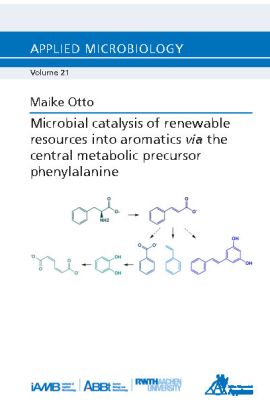Aromatics are versatile compounds required for numerous applications used in everyday life, but their petrochemical production goes along with fossil resource depletion and negative environmental impacts. Microbial catalysis offers alternative production concepts for aromatics, in processes that use renewable substrates and cause fewer emissions. As many aromatics display enhanced toxicity towards microbes, the utilization of especially robust host cells is required to allow their efficient microbial production. Bacteria of the genus Pseudomonas thrive in challenging environments and are thus promising candidates for the production of toxic aromatics.
This work describes the domestication of Pseudomonas species to produce various aromatic chemicals. The application of rational metabolic engineering strategies, including the deletion and alteration of chromosomal elements and the overexpression of heterologous genes, resulted in Pseudomonas taiwanensis strains that efficiently accumulate L-phenylalanine. Heterologous expression of a plant gene then allowed high-yield synthesis of the aromatic building block trans-cinnamate. The strains were further used as platform to produce several chemical compounds of industrial interest, including styrene, pinosylvin, benzoate, catechol and cis,cis-muconate.
In addition, a novel tool for the targeted integration of heterologous genetic elements into ribosomal operons of Pseudomonas was established. Here, the high activity of ribosomal promoters in combination with transcript-modulation by synthetic elements allowed high expression rates of foreign genes. The tool furthermore allowed analysis of the different ribosomal operons in the strain Pseudomonas putida S12.
Altogether, this thesis delivers insights into engineering approaches of highly versatile Pseudomonas species, thereby bringing the application of this interesting host one step closer towards efficient industrial processes.
| Autor | Otto, Maike |
|---|---|
| Lieferzeit | 3-4 Tage |
| Gewicht | 0.235 kg |
| Erscheinungsdatum | 02.06.2020 |
Applied Microbiology
Microbial catalysis of renewable resources into aromatics via the central metabolic precursor phenylalanine
Kurzbeschreibung
This work describes the domestication of Pseudomonas species to produce various aromatic chemicals. The application of rational metabolic engineering strategies, including the deletion and alteration of chromosomal elements and the overexpression of heterologous genes, resulted in Pseudomonas taiwanensis strains that efficiently accumulate L-phenylalanine. Heterologous expression of a plant gene then allowed high-yield synthesis of the aromatic building block trans-cinnamate. The strains were further used as platform to produce several chemical compounds of industrial interest, including styrene, pinosylvin, benzoate, catechol and cis,cis-muconate.

